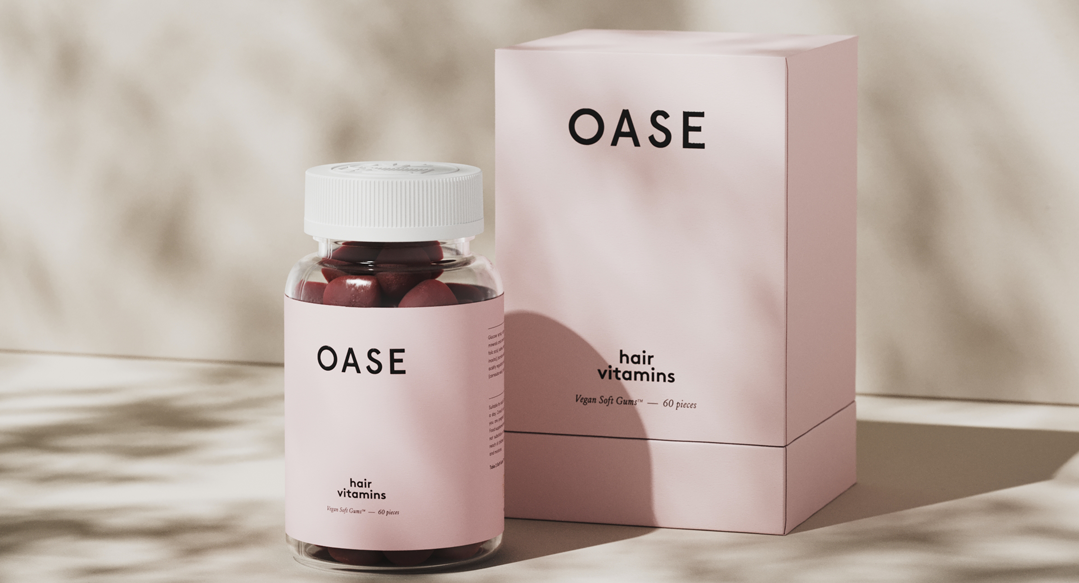Biotin for Healthier, Longer and Better Looking Hair.

If you've spent time investigating a solution to hair loss or what the panacea is to get longer, healthier, and more beautiful hair then you've undoubtedly read about biotin for hair growth. However, that doesn't mean that it is actually a miracle cure. In this blog, you'll read what biotin is, how to get enough in, and what the scientifically proven effects are on hair growth.
What is biotin?
We'll start by telling you what it isn't: a miracle cure for male pattern baldness, that doesn't exist. However, unlike many other nutrients that claim to provide positive results, there is some evidence that increasing biotin consumption can slow hair loss and promote hair growth.
Biotin is a B vitamin. Vitamin B8 to be precise. It is also called vitamin H or coenzyme R (because science likes to keep things confusing).
Like all B vitamins, biotin also helps the body convert food into energy and break down proteins and fats.
Biotin sources
Biotin comes from the natural action of intestinal bacteria or from food you eat every day. Yeast, egg yolk, cauliflower, avocado, raspberries, carrots, bananas, pork, liver, and salmon are all good sources of biotin. Cooking lowers the biotin concentration, so the vegetable sources of biotin are best eaten raw if you try to increase the biotin intake in a natural way.
Biotin deficiency
A biotin deficiency is rare in a Western society. Biotin deficiency is so rare that the Health Council of the Netherlands has not set a Recommended Daily Allowance (RDA), but only a target value. This only indicates the direction of what you need. The Health Council of the Netherlands states that a daily intake of approximately 40 micrograms of biotin is sufficient.
It is therefore unlikely that you will have a biotin deficiency. If you do have a biotin deficiency, various symptoms are possible:
- a dry mouth;
- scaly rash around the mouth, nose, eyes, or genitals;
- swollen and sore tongue;
- loss of appetite;
- depression;
- insomnia;
- unusual fat distribution on the face;
- hair loss (!).
Biotin and hair growth
Keratin is an important protein from which hair is made, and biotin plays an important role in keratin production. It's not exactly clear how, but unlike many dietary supplements for hair loss, there is some evidence that biotin works
The research: nutrition
A 2016 study published in the International Journal of Trichology found that 38% of women who complained of hair loss were actually short of biotin.
Another study indicated improved hair growth during the use of biotin supplements. It is important to note that this study was funded by Lifes2good - a Chicago-based company that uses the supplement in the study. Although this does not invalidate the researchers' findings, it is worth mentioning. It is possible that this study has been "steered" in the right direction for the company to make money.
Another study on the effectiveness of biotin on hair growth was published in 2015. Sixty women participated, 30 of whom received the supplement (a combination of biotin, zinc, and protein complex) and 30 received a placebo. The researchers concluded that their supplement reduced hair loss and increased hair growth.
The study: applying to the scalp in the form of lotion
Another possible way to stimulate hair growth would be to apply biotin to the scalp in the form of a lotion. The counter-argument is that you don't physically apply nutrition to the part of your body where you are experiencing symptoms. When is the last time you applied an orange peel (vitamin C) to your nose during a cold?
That's why applying biotin to the hair or scalp is likely to do little or nothing to stop your hair loss. It is not even clear whether the hair/ scalp can absorb biotin.
Nevertheless, there is no shortage of hair loss products with biotin as the main ingredient. Shampoos, oils, conditioners, serums - all of this is probably a waste of money unless the products contain other active ingredients that stimulate hair growth. There is currently no clear evidence that the topical application of biotin will stop or slow down hair loss.
Biotin Risks
There is little risk associated with taking a biotin supplement. There is no daily upper limit, because the body will remove excess through the urine. Keep in mind that "the more, the better" does not apply to biotin. Some supplements contain incredibly high doses, which is absolutely unnecessary. Although not proven, users of these high-dose supplements report an increase in acne. Improve her advice to use a supplement that contains between 1 and 5 milligrams per day. More is really not necessary.
Conclusion
It is unlikely, but not impossible, that your hair loss is caused by a biotin deficiency. Hair loss is just one of the many symptoms of a real deficiency of this vitamin. If you suspect a deficiency, check for other possible symptoms such as rough and flaky patches on the skin, swollen tongue, and fat deposits on the face. If this is the case, we recommend that you see a doctor. This problem is relatively easy to solve.
For those of us with a normal level of biotin: it is still possible to increase the biotin intake through nutrition or a supplement. Remember that biotin is a water-soluble ingredient and very high doses are not necessary. Excess biotin will leave the body through urine.
Biotin is one of the few nutrients that has been proven to contribute to healthy hair growth and work against hair loss. If you suffer from hair loss or poor hair growth, we think it's worth taking a supplement with biotin and other hair growth stimulating ingredients.
OASE Hair Vitamins is a vegan hair supplement that contains all the essential nutrients - including 3 milligrams of biotin - for healthier, longer, and more beautiful hair. Take only two gummies a day and you can be sure that your body is supplied daily with all the nutrients it needs to get the most out of hair growth.
